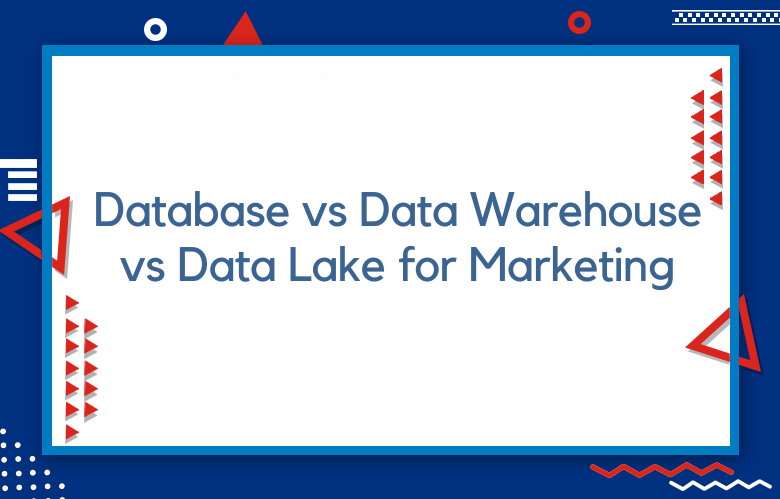Database vs Data Warehouse vs Data Lake for Marketing

If you’re a marketer, you know that data is essential for creating successful campaigns and understanding customer behavior.
But what is the most effective way to store and manage this data? Should you use a database, a data warehouse, or a data lake?
We’ll explain the differences between these three storage systems and how they can be used in marketing.
When it comes to data storage, marketers should be aware of three different systems: databases, data warehouses, and data lakes.
All three have features and benefits that can help a marketing team store, organize, and interpret their data.
But how do you know what is suitable for your marketing team? Let’s break down the differences.
Database Systems
A database system stores data in a structured format to easily retrieve, update, and manipulate it.
It’s ideal for storing information that needs to be accessed frequently, such as customer contact information or purchase history.
A database system makes it easy to query specific pieces of information quickly. It makes it perfect for quick analysis of customer trends or sales performance.
Data Warehouse Systems
A data warehouse system stores large amounts of data from multiple sources in a central repository. This system is used to keep historical records or long-term trends.
It can also store large amounts of unstructured data, such as text documents or images.
Data warehouses are best for detailed analysis over time because they allow you to access all the data in one place without searching multiple databases.
This makes them great for creating complex reports and performing deep dives into customer behavior trends.
Data Lake Systems
A data lake system stores large amounts of raw unstructured data from multiple sources in a single repository.
The benefit of this system is that it allows you to store all types of data without needing to structure it first.
This makes it ideal for collecting vast amounts of raw customer feedback or product reviews that may not fit into traditional databases or warehouse structures but still need to be stored somewhere and analyzed later.
Database vs. Data Warehouse vs. Data Lake
A database is an organized collection of structured information stored electronically on a computer system. This system is ideal for storing transactional data, which can easily be updated or removed.
A data warehouse is different from a database in that it stores large amounts of historical data that can be used for analytics and reporting.
Finally, a data lake stores raw, unstructured data in its original format so anyone with the correct permissions can easily access it.
Using Database Systems in Marketing
Marketers often use database systems to store customer information such as contact details, purchase history, and preferences.
It allows marketers to segment their customers into different groups based on their interests or characteristics.
This readily available information makes it much easier to create targeted campaigns that are more likely to resonate with each group of customers.
With databases, you can also track how your customers respond to different campaigns so you can adjust your strategy accordingly.
Using Data Warehouses in Marketing
Data warehouses are helpful for marketers who need to analyze large amounts of historical customer or product data over time.
This system allows marketers to look at trends and patterns to understand their target audience better and make informed decisions about future strategies.
For example, if you’re launching a new product line, a data warehouse would help you understand which products were successful in the past and make better decisions about which products to include.
Using Data Lakes in Marketing
Data lakes are extremely useful for marketers who quickly need access to large amounts of unstructured customer data without first cleaning up or formatting the information.
For instance, if you want to analyze social media conversations about your brand or products, a data lake would allow you to do that without manually organizing all the relevant tweets or posts.
Because this type of system stores raw data instead of formatted information like databases do, it gives marketers more flexibility when analyzing customer behavior or creating targeted campaigns for specific audiences segmented by demographics or interests.
What is the difference between a Database, Data Warehouse, and Data Lake for Marketing purposes?
There is a distinct difference between a database, a data warehouse, and a data lake for marketing.
A database is a structured data collection organized in tables that can query to generate reports.
It stores transactional or operational data in real-time and allows for quick analysis and visualization of the stored data.
A data warehouse is designed to store large volumes of historical information over long periods.
It is used for deep analyses, such as gaining insights into customer behavior over time or monitoring changes in sales trends from period to period.
Lastly, a data lake is an unstructured repository of raw, detailed datasets that provide a more holistic view across the organization’s digital information ecosystem.
Data lakes are great for gaining insights into structured and unstructured datasets and identifying correlations between data types.
One could combine transactional records with web interactions or social media engagement to gain deeper insights into how customers interact with their brand and what motivates them to purchase.
Each platform offers unique benefits regarding marketing purposes, so it’s essential to understand how each one works best to get the most value out of their use.
Which is better for Marketing: a Database, Data Warehouse, or Data Lake?
When it comes to marketing, there is no one-size-fits-all solution. Each of the three options—database, data warehouse, and data lake—has its unique benefits, depending on the specific needs of a business and its marketing strategies.
A database is the most basic form of data storage for marketers. It stores customer information such as contact details and purchase history.
A database’s advantages include fast query times and low storage costs, making it ideal for small businesses that need to store large amounts of customer information quickly and cheaply.
Data warehouses provide more robust features than databases, enabling marketers to store large volumes of data organizationally.
This system allows organizations to integrate different data types from other sources into one single repository, giving them more comprehensive insights into their customers’ behavior and preferences.
Data warehouses also enable organizations to quickly execute complex queries on their stored data, making them well-suited for large enterprises with complicated marketing strategies.
Data lakes are relatively new but have already become essential for organizations leveraging big data analytics for marketing purposes.
By gathering all available customer information from multiple sources into one platform, data lakes allow companies to identify trends in consumer behavior that may be overlooked when using databases or data warehouses alone.
Moreover, the ability to store large volumes of unstructured data makes them particularly appealing when dealing with text-based or image-based content gathered through various online platforms such as social media sites or surveys.
How do Databases, Data Warehouses, and Data Lakes compare for Marketing use cases?
There are many differences between the three that must be considered when using databases, data warehouses, and data lakes for marketing use cases.
Databases are structured data for online transaction processing (OLTP) or online analytical processing (OLAP).
They support efficient retrieval of related information from multiple tables, allowing analysts to identify trends and discrepancies quickly.
Data warehouses are designed to organize large amounts of historical data and leverage advanced analytics techniques such as predictive modeling and machine learning.
These can be used to analyze customer behavior patterns over time, uncover hidden correlations between variables, and make better-informed decisions when creating campaigns.
Data lakes are unstructured repositories built to store vast amounts of raw data collected from multiple sources.
It provides flexibility in terms of what types of data can be stored, including both structured and unstructured formats. Data lakes allow marketers to gain deeper insights into customer preferences by gathering more granular information.
Combining all the different data types in one place can generate more holistic views of customers and help them better understand their behavior.
Can a Data Lake be used for Marketing Analytics, or is a Database or Data Warehouse a better choice?
A data lake can be used for marketing analytics, but it is not necessarily the best choice, as there are other options.
Depending on the company’s particular needs, a database or data warehouse may offer a better option.
Data lakes have more storage capacity and scalability than databases or data warehouses, benefiting more prominent companies that need to store and analyze large volumes of data.
However, compared to databases and data warehouses, a data lake typically takes longer to set up, has weaker security protocols, and must be more accurate.
Querying in a data lake is often more complicated since it generally has fewer indexes or pre-defined structures than traditional databases or warehouses.
As such, companies must weigh the pros and cons before deciding whether or not a data lake would be an appropriate tool for marketing analytics.
Choosing between a data lake, database, or warehouse should depend on the organization’s specific goals and objectives and its ability to manage complex infrastructure across multiple systems.
How does a Data Warehouse differ from a Database or Data Lake in terms of Marketing Data Management?
A data warehouse differs from a database or data lake when it comes to marketing data management in several ways:
- A data warehouse is designed explicitly for analytical purposes and is optimized to minimize query latency, which is beneficial for marketing analytics and reporting. A data warehouse also provides a consolidated view of all the relevant marketing data, whereas databases store discrete chunks of information. On the other hand, data lakes store raw unstructured data in their native format and may lack standards and consistency.
- A data warehouse often has an additional layer of security compared to databases and data lakes, as it only allows users with specific privileges access to the stored information.
- A data warehouse is regularly updated to track current trends and insights, while databases may need to be updated only frequently.
- It is much easier to control and monitor changes made within a data warehouse than in a database or a large-scale data lake.
All these advantages make using a data warehouse preferable when dealing with complicated marketing scenarios that require deep analysis, accurate insights, and robust security measures.
What are the pros and cons of a Database, Data Warehouse, or Data Lake for Marketing Data Storage and Analysis?
I use a database, data warehouse, or data lake to store and analyze marketing data, which offers advantages in decision-making.
Some pros include the ability to store large amounts of data in decision-making, increased scalability and flexibility, faster access to valuable insights, and improved security and performance.
Databases are also generally more accessible to implement than data warehouses or lakes, which can require a more upfront investment in hardware and software requirements.
Databases often come with user authentication and authorization features, high availability options, backup capabilities, and other built-in features that make them ideal for marketing.
On the other hand, using a database for marketing can lead to some potential drawbacks:
- Databases tend to be more expensive than the alternatives since they require a more initial investment in hardware and software resources. Also, depending on the size of the database, it may take longer to retrieve information or access deeper insights, resulting in slower response times compared to a data warehouse or lake, where specific queries can run much quicker.
- While databases offer a variety of built-in features, they often need more advanced analytics tools, such as machine learning capabilities, which are available in other solutions like data warehouses or lakes.
- Manual processes during loading or updating operations increase the risk of introducing errors, which requires additional oversight when implementing a database solution for marketing purposes.
In what situations would a Marketing Team want to use a Database, Data Warehouse, or Data Lake?
A marketing team should use a database when they need to store a large amount of structured data for their campaigns, such as customer information and purchase histories.
For example, if a business needs to track how customers interact with their services over time and make adjustments based on the data, it can use a database to store that data.
Data warehouses are used when businesses need to process complex queries on large datasets from one or more sources.
They help marketers analyze customer behavior and trends during different campaigns quickly and accurately.
Data lakes can help businesses combine multiple datasets into one place, allowing marketers to find patterns and better target potential customers.
For example, suppose a company has sales records from its website and social media accounts.
In that case, they can combine those into one data pool to uncover insights such as which customer types have higher conversion rates or which products sell the best.
The advantage of using a data lake is that marketers can access all the raw data in one place instead of searching through multiple systems for their analysis.
How do the scalability and performance of Databases, Data Warehouses, and Data lakes compare for Marketing Data Workloads?
The scalability and performance of databases, data warehouses, and data lakes for marketing data workloads can vary significantly depending on the size and complexity of the organization’s dataset.
For instance, databases are often used to store structured marketing data and are optimized for transaction-oriented applications requiring frequent reading and writing.
This makes them suitable for managing smaller datasets with fewer users or lower complexity.
On the other hand, data warehouses offer greater scalability when dealing with larger datasets, as they are designed to handle large amounts of read/write operations over extended periods.
They are optimized for analytical workloads such as processing aggregated customer segmentation analysis, enabling sharper insights into customer behavior.
Data lakes provide a low-cost solution to manage large unstructured datasets while allowing organizations to capture all types of data from various sources.
Although they are less efficient than databases or data warehouses in query response time and write performance, their scalability makes them ideal for advanced analytics use cases such as machine learning or predictive analytics that require larger datasets for training models.
Evaluating the organization’s requirements is essential to determine which technology provides the best scalability and performance for each marketing data workload.
How do the cost and complexity of Databases, Data Warehouses, and Data Lakes compare for Marketing Data Management?
Understanding the differences between databases, data warehouses, and data lakes is critical when marketing data management.
Databases are the most cost-effective option, as they are usually relatively small and require little maintenance. However, because of their smaller size, databases are not designed to handle complex queries or large volumes of data.
Data warehouses offer a more complex solution that allows organizations to store large amounts of structured data in one centralized location and perform complex queries. This makes them ideal for larger organizations that need to analyze large volumes of data quickly and efficiently.
Data lakes provide even greater complexity by allowing organizations to store structured and unstructured data in one central repository.
This enables organizations to build custom datasets from disparate sources while also providing scalability for growth over time. While this complexity results in higher costs than databases or data warehouses, its flexibility far outweighs any additional expense.
What are the critical considerations for choosing a Database, Data warehouse, or Data Lake for Marketing Data Storage and Analysis?
Several key considerations should be remembered when choosing between a database, data warehouse, or data lake for marketing data storage and analysis.
The first is scalability – databases are typically better suited for more minor data. At the same time, data warehouses and lakes can scale up to handle large volumes of data collected over long periods.
Databases are better at handling structured queries and single transactions. In contrast, warehouses and lakes are better equipped to handle analytics tasks such as predictive models or machine learning applications that predict customer outcomes based on past behaviors.
Another critical consideration is the cost implications.
Databases tend to be more economical than warehousing/lakes for smaller sets of structured and well-defined marketing information; however, larger datasets may require a massive investment in hardware infrastructure and software licenses to manage the resulting complexity effectively.
On the other hand, warehousing/lake solutions tend to be more flexible regarding varying levels of complexity across different datasets, allowing marketers to combine multiple data sources into one platform without needing additional hardware investments.
There’s the recovery speed factor: if a problem arises with a database system (e.g., corruption), most databases can quickly restore by simply reverting to an earlier backup version, whereas with either a warehouse or lake implementation, due to their correlation-based nature, it may take considerably longer (and potentially require manual intervention) before all impacted datasets become accessible again.
This could have disastrous consequences if an organization relies heavily on these systems for daily operations.
Conclusion
Data management systems play an essential role in marketing success by enabling marketers to store customer information safely and securely while providing access to powerful analytics tools that allow them to make informed decisions about their strategies and tactics moving forward.
Whether you choose a database, a data warehouse, or a data lake will depend on your specific needs. Still, all three solutions offer benefits that could help your business succeed online.
No matter which option you choose, ensure your system is secure and compliant with applicable regulations such as GDPR so your customers’ privacy remains protected at all times!
As a marketer, it is essential to understand the differences between these data types and when to use them.
A database is simply a collection of data that computers can query.
A data warehouse is a database used to store historical data and facilitate analytics on that data.
A data lake is a repository for structured and unstructured data.
As a general rule, if you want to store data so that you can query it and do some fundamental analysis, you should use a database.
It would help to use a data warehouse to store historical data for more sophisticated analysis.
And if you want to store everything in case someone needs it someday, you should use a data lake.
We will help you determine which dataset best suits your needs and how often it should be updated based on your marketing goals.
Call: +91 9848321284
Email: [email protected]



